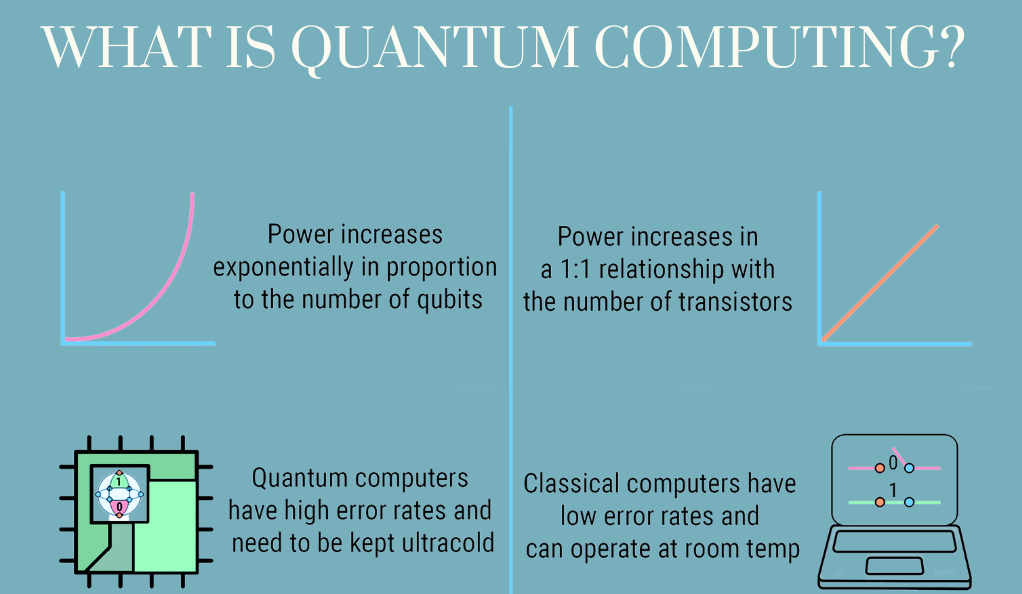In the realm of technological advancements, quantum computing stands as one of the most groundbreaking and transformative innovations. With the potential to revolutionize industries, from healthcare to finance, its capabilities are vast and profound. However, with great power comes great responsibility. As we stand on the cusp of a quantum era, it’s imperative to understand not only the technological implications but also the ethical considerations that accompany this new frontier.
What is Quantum Computing?
At its core, quantum computing is a new paradigm of computation that leverages the principles of quantum mechanics, a fundamental theory in physics that describes the nature of matter and energy on the atomic and subatomic scale. Traditional computers use bits as the smallest unit of data, which can be either 0 or 1. Quantum computers, on the other hand, use quantum bits or qubits. Unlike classical bits, qubits can exist in a superposition, meaning they can be both 0 and 1 simultaneously. This property allows quantum computers to process vast amounts of information at once, making them exponentially more powerful than classical computers for certain tasks.

| Classical Computing | Quantum Computing |
|---|---|
| Uses bits (0 or 1) | Uses qubits (0, 1, or both) |
| Sequential processing | Parallel processing due to superposition |
| Deterministic outcomes | Probabilistic outcomes due to quantum mechanics |
The Ethical Landscape of Technology
As technology continues to evolve at an unprecedented rate, so too does the ethical landscape that surrounds it. From concerns about data privacy with the rise of big data to the societal implications of artificial intelligence, the intersection of technology and ethics has never been more pertinent. Quantum computing, with its potential to decrypt secure information, simulate complex biological processes, and more, introduces a new set of ethical challenges. Balancing the promise of quantum computing with the potential risks is a task that researchers, policymakers, and society at large must undertake collectively.
Understanding Quantum Computing
Quantum computing, while a buzzword in many tech circles, remains an enigma to the general populace. To truly grasp its ethical implications, one must first understand its foundational principles and the transformative potential it holds.
The Quantum Realm
Quantum mechanics, the underlying science behind quantum computing, is a branch of physics that delves into the behavior of particles at the atomic and subatomic levels. It’s a world where traditional laws of physics seem to break down, replaced by phenomena like superposition and entanglement.
- Superposition: As mentioned earlier, while a classical computer bit must be either 0 or 1, a qubit in a quantum computer can be 0, 1, or both 0 and 1 at the same time. This phenomenon is known as superposition. It allows quantum computers to explore multiple solutions simultaneously, vastly increasing their computational power.
- Entanglement: Another quantum phenomenon, entanglement, occurs when pairs or groups of qubits interact in such a way that the state of one qubit cannot be described independently of the state of the other qubits. This interconnectedness, even across vast distances, is a cornerstone of quantum computing and is what enables the creation of powerful quantum algorithms.
Potential and Promise of Quantum Computers
The capabilities of quantum computers extend far beyond just faster computations. Their potential applications are both vast and transformative:
- Cryptography: Quantum computers have the potential to break many of the encryption methods currently in use, leading to a complete overhaul of our current security systems.
- Drug Discovery: By simulating complex molecular and chemical reactions, quantum computers can aid in the discovery of new drugs and treatments, potentially revolutionizing the field of medicine.
- Optimization Problems: From logistics to finance, quantum computers can find optimal solutions to problems that are currently too complex for classical computers.
- Climate Modeling: Quantum computers can help simulate and analyze climate models with unprecedented accuracy, aiding in our understanding and potentially offering solutions to combat climate change.
| Application | Impact of Quantum Computing |
|---|---|
| Cryptography | Potential to decrypt secure data, necessitating new encryption methods. |
| Drug Discovery | Accelerated research leading to faster medical breakthroughs. |
| Optimization | Solutions to complex problems in various industries. |
| Climate Modeling | Enhanced accuracy in predicting and understanding climate patterns. |
The Ethical Implications
As we venture deeper into the quantum realm, the ethical dimensions of this technology become increasingly evident. The power of quantum computing, while promising, introduces a myriad of concerns that extend beyond the technical and into the moral and societal spheres.
Potential Misuse of Quantum Power
The very strengths of quantum computing can also be its vulnerabilities when placed in the wrong hands:
- Data Privacy and Security: With the potential to break current encryption methods, quantum computers could compromise the security of sensitive data, from personal information to state secrets. This raises concerns about privacy breaches, identity theft, and even potential threats to national security.
- Economic Disruption: As quantum computers can optimize complex problems, they might render certain jobs and skills obsolete, leading to economic shifts and potential job losses in specific sectors.
- Weaponization: The power of quantum computing could be harnessed for malicious purposes, from creating advanced weaponry to cyber warfare tactics that could cripple infrastructures.
Risk to Current Cryptographic Systems
Our current digital world relies heavily on cryptographic systems to ensure data integrity and privacy. Quantum computing poses a significant threat to these systems:
- Shor’s Algorithm: A quantum algorithm that can factor large numbers exponentially faster than the best-known algorithms running on classical computers. This could potentially break RSA encryption, a widely used method to secure online transactions and communications.
- Post-Quantum Cryptography: In anticipation of the quantum threat, researchers are already working on cryptographic methods that can withstand quantum attacks. This field, known as post-quantum cryptography, is crucial for ensuring a smooth transition to a quantum era without compromising security.
Ethical Responsibilities of Quantum Researchers and Developers
With great power comes great responsibility. Those at the forefront of quantum advancements have an ethical duty to:
- Transparency: Openly communicate the capabilities, limitations, and potential risks associated with quantum technologies.
- Collaboration: Work alongside ethicists, policymakers, and other stakeholders to ensure the responsible development and deployment of quantum technologies.
- Education: Foster a well-informed public by demystifying quantum computing and its implications, ensuring society can make informed decisions about its use.
- Safeguarding: Implement measures to prevent the misuse of quantum technology, from robust security protocols to ethical guidelines for research and application.
Balancing Innovation and Responsibility
The allure of quantum computing lies in its transformative potential. Yet, as with all powerful innovations, there’s a delicate balance to be struck between pushing the boundaries of what’s possible and ensuring that we do so responsibly.
The Need for Responsible Research and Development
- Ethical Oversight: Research in quantum computing should be subject to ethical review, much like medical research. This would ensure that projects consider potential societal impacts and are aligned with ethical standards.
- Inclusive Development: Quantum technology should be developed with a diverse set of voices at the table. Including perspectives from different cultures, genders, and socioeconomic backgrounds can help in identifying potential biases and blind spots.
- Long-term Vision: While the immediate benefits of quantum computing are enticing, researchers and developers must also consider the long-term implications of their work. This includes potential environmental impacts, societal shifts, and changes to the global economic landscape.
Ethical Guidelines for Quantum Computing Advancements
Establishing a clear set of ethical guidelines can help navigate the challenges posed by quantum computing:
- Data Integrity: Ensure that quantum technologies respect and uphold data privacy standards, especially as they have the potential to disrupt current encryption methods.
- Beneficence: Quantum advancements should aim to benefit humanity as a whole, avoiding applications that could harm individuals or specific groups.
- Transparency and Accountability: Organizations and researchers should be transparent about their quantum initiatives, allowing for public scrutiny and accountability.
- Education and Awareness: As quantum computing becomes more mainstream, there’s a need for widespread education to ensure that individuals, businesses, and governments understand the technology and its implications.

Quantum Computing and Global Collaboration
The challenges and opportunities presented by quantum computing are not confined to any one nation or region. They are global in scope, necessitating international collaboration:
- Shared Standards: Countries should come together to establish shared ethical and technical standards for quantum research and application.
- Open Dialogue: Regular international forums can facilitate discussions on the latest quantum advancements, their societal implications, and best practices for responsible development.
- Collaborative Research: Joint research initiatives can pool resources, knowledge, and expertise, driving quantum advancements that are both innovative and ethically sound.
Quantum Computing and Society
As quantum computing edges closer to becoming a practical reality, its ripple effects on society are undeniable. From reshaping industries to influencing everyday life, the societal implications of a quantum-powered world are vast and multifaceted.
How Quantum Computing Can Reshape Industries
- Healthcare: Beyond drug discovery, quantum computers can assist in analyzing complex biological data, potentially leading to personalized medicine tailored to an individual’s genetic makeup.
- Finance: Quantum algorithms can optimize trading strategies, manage risk more effectively, and even predict market movements with higher accuracy.
- Energy: Quantum computers can simulate and optimize energy consumption patterns, leading to more efficient power grids and potentially aiding in the development of sustainable energy sources.
- Transportation: From optimizing traffic flow in smart cities to enhancing the design and materials used in vehicles, quantum computing can revolutionize how we move.
The Societal Implications of a Quantum-Powered World
- Education: As quantum computing becomes mainstream, curricula at all levels will need to adapt, introducing quantum principles to students and preparing them for a workforce where quantum literacy is essential.
- Job Market: While certain roles may become obsolete due to quantum optimization, new job opportunities will emerge in quantum software development, quantum hardware engineering, and quantum research.
- Ethical Dilemmas: The power of quantum computing will introduce new ethical challenges, from data privacy concerns to the potential for creating socioeconomic divides based on access to quantum technologies.
- Cultural Shifts: Just as the internet brought about a digital revolution, quantum computing might usher in a new cultural era, influencing art, entertainment, and even our perception of reality.
The Role of Governments and Institutions
- Regulation: Governments will play a crucial role in regulating the use of quantum technology, ensuring it’s used ethically and doesn’t compromise national or global security.
- Investment: Public funding can drive quantum research, ensuring that advancements are made with societal benefits in mind.
- Public Awareness: Governments and institutions can spearhead public awareness campaigns, educating citizens about the benefits and challenges of quantum computing.
- Collaboration: By fostering collaboration between academia, industry, and policymakers, governments can ensure a holistic approach to quantum development.
Conclusion
As we approach the dawn of the quantum era, the intertwining paths of technological innovation and ethical responsibility become ever more crucial. Quantum computing, with its transformative potential, offers a future brimming with possibilities—from medical breakthroughs to sustainable energy solutions. However, this promise is accompanied by profound ethical challenges that demand our collective vigilance.
The journey ahead is not solely about harnessing quantum power but ensuring it aligns with our shared human values. As we navigate this new frontier, a balanced approach—prioritizing continuous learning, inclusive dialogue, and collaboration—will be paramount. In embracing the quantum future, our guiding principle should be a commitment to the betterment of humanity, ensuring a world where technology uplifts and unites.




